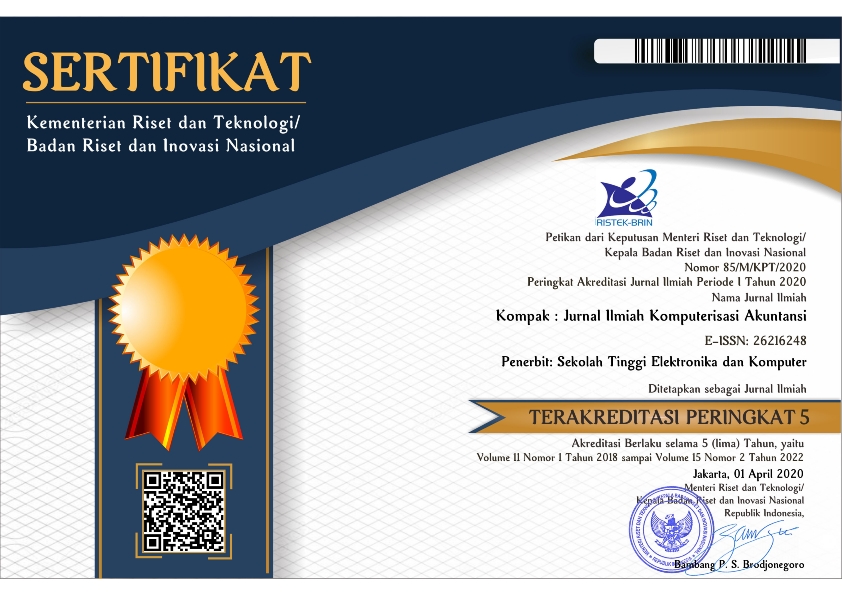Pengaruh Ekspor, Impor, Defisit Fiskal, Dan Utang Luar Negeri Terhadap Pertumbuhan Ekonomi Di Indonesia Periode 2017 – 2020
Abstrak
Economic growth is a process of economic change that occurs in a country on an ongoing basis to lead to changes for the better over a certain period of time. The development of the Indonesian economy cannot be separated from the influence of various factors, including factors from abroad. Economic growth is influenced by several factors including exports, imports, fiscal deficits, and foreign debt. This study aims to determine the effect of exports, imports, fiscal deficits and foreign debt on economic growth in Indonesia for the 2017-2020 period. The sample selection in this study used the cluster sampling method because the objects and data sources to be studied were very broad, consisting of 34 provinces in Indonesia, the total data used was 680 samples. The data analysis technique used in this research is multiple linear regression analysis. The results of this study indicate that exports have a negative and significant effect on economic growth. Imports have a positive and insignificant effect on economic growth. The fiscal deficit has a positive and insignificant effect on economic growth. Foreign debt has a positive and significant effect on economic growth. Further researchers can also continue this research with a qualitative approach, where several variables that have no significant effect can be studied and analyzed by several key stakeholders who have a direct role in economic growth, so that further research models can be better.
Referensi
Bambungan, A. G., Rotinsulu, T. O., & Mandeij, D. (2021). Analisis Pengaruh Ekspor Impor Utang Luar Negeri Dan Penanamanmodal Asing Terhadap Pertumbuhan Ekonomi Di Indonesia Periode 2013:Q1-2018:Q4. Jurnal EMBA: Jurnal Riset Ekonomi, Manajemen, Bisnis Dan Akuntansi, 9(2), 848–860.
CNN Indonesia. (2020). Sri Mulyani: Dampak Virus Corona Berat ke Perekonomian. https://www.cnnindonesia.com/ekonomi/20200401111243-532-489012/sri-mulyani-dampak-virus-corona-berat-ke-perekonomian
Defarahmi, H., & Zulkifli. (2017). Dampak Defisit Anggaran dan Penanaman Modal Asing terhadap Pertumbuhan Ekonomi Indonesia. Jurnal Ilmiah Mahasiswa (JIM), 2(4), 618–625.
Feranika, A., & Haryati, D. (2020). Strategi Kebijakan Fiskal Terhadap Output dan Inflasi pada Perekonomian Indonesia dalam Menghadapi Dampak Virus Covid 19. Business Innovation and Entrepreneurship Journal. 2(3). 146-152.
Harahap, E. F., Luviana, L., & Huda, N. (2020). Tinjauan Defisit Fiskal, Ekspor, Impor Dan Jumlah Umkm Terhadap Pertumbuhan Ekonomi Indonesia. Jurnal Benefita, 5(2), 151. https://doi.org/10.22216/jbe.v5i2.4907
Hodijah, S., & Angelina, G. P. (2021). Analisis Pengaruh Ekspor Dan Impor Terhadap Pertumbuhan Ekonomi Di Indonesia. Jurnal Manajemen Terapan Dan Keuangan, 10(01), 53–62. https://doi.org/10.22437/jmk.v10i01.12512
Machmud, Amir. (2016). Perekonomian Indonesia. Jakarta: Erlangga.
Mahendra, A. (2019). Analisis Pengaruh Ekspor, Utang Luar Negeri dan tenaga Kerja terhadap Pertumbuhan Ekonomi di Indonesia. Jurnal Stindo Profesional, V(3), 16–28.
Rumere, V. (2017). Defisit Anggaran dan Kebijakan Fiskal.
Putra, M. D. K. (2018). Pengaruh Penanaman Modal Asing Dan Utang Luar Negeri terhadap Pertumbuhan Ekonomi Indonesia. Universitas Brawijaya.
Undang-Undang Republik Indonesia Nomor 17 Tahun 2006 Tentang Kepabeanan, (2006).
Sugiyono. (2017). Metode Penelitian Kuantitatif, Kualitatif, dan R&D. Alfabet.
Swasono, D. A., & Martawardaya, B. (2015). Pengaruh Defisit Fiskal terhadap Pertumbuhan Ekonomi di Indonesia Periode 1990-2012. Jurnal Ekonomi Dan Pembangunan Indonesia, 15(2). https://doi.org/10.21002/jepi.v15i2.538
Ulfa, S., & Zulham, T. (2017). Analisis Utang Luar Negeri dan Pertumbuhan Ekonomi: Kajian Faktor-Faktor yang Mempengaruhinya. Jurnal Ilmiah Mahasiswa (JIM), 2(1), 144–152.













